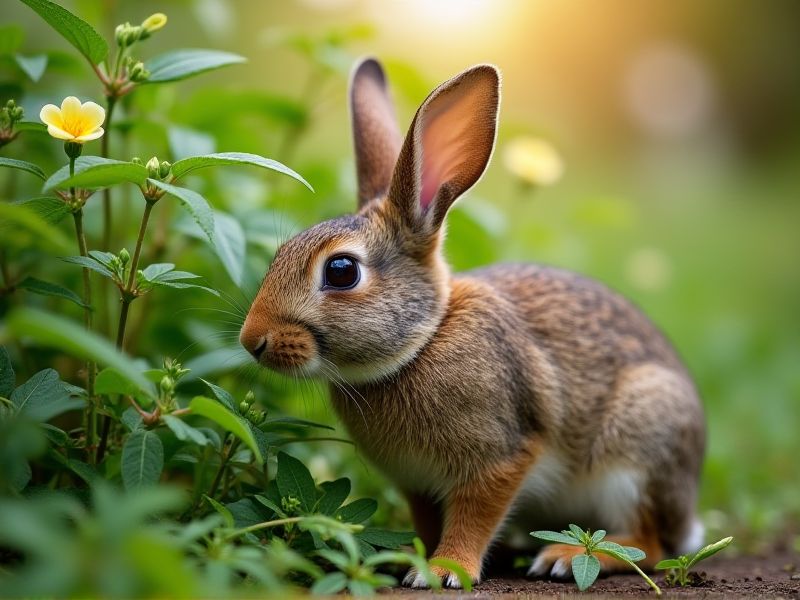
Bushy plants such as lavender, rosemary, and sage are excellent choices for deterring rabbits from your garden. These aromatic herbs not only add visual appeal but also release strong scents that rabbits typically avoid. Incorporating dense shrubs like holly or barberry can create barriers, making it difficult for rabbits to access your vibrant flower beds. Another effective option is witch hazel, which features thick foliage that provides natural protection. By selecting these plants, you can cultivate a garden that thrives without the threat of rabbit damage.
List of some Bushy plants that deter rabbits
- Lavender (Lavandula)
- Rosemary (Rosmarinus officinalis)
- Sage (Salvia officinalis)
- Barberry (Berberis)
- Boxwood (Buxus)
- Russian Sage (Perovskia atriplicifolia)
- Juniper (Juniperus)
- Butterfly Bush (Buddleja)
- Yucca (Yucca filamentosa)
- Dwarf Alberta Spruce (Picea glauca 'Conica')
Important things about Bushy plants that deter rabbits
Dense Foliage
Bushy plants like barberry, boxwood, and juniper are excellent choices to create dense foliage that effectively deters rabbits from invading your garden. The thorny branches of barberry serve as a natural barrier, making it difficult for rabbits to access your prized plants. Boxwood provides a thick, evergreen hedge, offering both aesthetics and protection against foraging animals. By incorporating these bushy plants into your landscape design, you can enhance the beauty of your garden while safeguarding it against rabbit damage.
Strong Scents
Bushy plants such as lavender, rosemary, and sage are effective natural deterrents against rabbits due to their strong scents. The aromatic oils in these plants can overwhelm a rabbit's sensitive sense of smell, making your garden less inviting. Planting these robust herbs not only enhances the visual appeal of your landscape but also provides edible options for kitchen use. Incorporating a variety of these fragrant bushes creates a natural barrier, protecting your valuable flora from hungry herbivores.
Thorny Stems
Bushy plants with thorny stems serve as an effective natural barrier against rabbits, protecting your garden from these nibbling pests. Varieties like blackberries, raspberries, and certain types of rose bushes not only provide dense foliage but also feature sharp thorns that discourage rabbits from entering. Additionally, these plants can enhance the aesthetic appeal of your landscape while offering delicious fruits for your enjoyment. Incorporating thorny bushy plants into your garden design can create a protective and fruitful environment, safeguarding your flowers and vegetables.
Bitter-Tasting Leaves
Bushy plants such as the common lilac (Syringa vulgaris) and barberry (Berberis spp.) are known for their bitter-tasting leaves, which can effectively deter rabbits from munching on them. These plants not only provide a dense foliage structure that creates a natural barrier but also enrich your garden with vibrant colors and attractive blooms. Incorporating these rabbit-resistant varieties into your landscaping can protect your garden while enhancing its aesthetic appeal. By choosing plants with unpalatable foliage, you can cultivate a more resilient garden ecosystem that supports biodiversity.
Heightened Growth
Bushy plants, such as barberry and hawthorn, are excellent choices for deterring rabbits due to their dense foliage and thorny branches. These plants not only create a protective barrier but also provide habitats for beneficial wildlife, enhancing biodiversity in your garden. Incorporating bushy varieties like boxwood or lilac can improve both aesthetic appeal and defensive qualities, making your landscape less inviting to rabbits. By selecting the right bushy plants, you can effectively safeguard your garden while promoting growth and resilience.
Natural Repellents
Bushy plants, such as lavender, rosemary, and sage, are highly effective natural repellents that deter rabbits from your garden. These aromatic herbs emit strong scents that are unappealing to rabbits, making them less likely to venture into areas where these plants are present. Incorporating a variety of bushy plants not only enhances your garden's aesthetics but also creates a natural barrier against these common herbivores. By cultivating these resilient species, you can protect your prized flowers and vegetables while promoting a healthier ecosystem.
Unpalatable Varieties
Bushy plants, such as barberry (Berberis) and juniper (Juniperus), serve as effective deterrents against rabbits due to their unpalatable foliage and thorny structures. These ornamental and functional varieties not only enhance garden aesthetics but also provide a natural barrier that discourages browsing by herbivores. Incorporating these plants into your landscape can create a protective zone around more vulnerable species, effectively reducing the risk of rabbit damage. When strategically placed, such bushy plants can foster a healthier garden environment while minimizing the need for chemical repellents.
Seasonal Growth Patterns
Bushy plants such as lavender, sage, and rosemary exhibit significant seasonal growth patterns, flourishing during warmer months before entering dormancy in winter. These robust plants not only thrive in well-draining soil but also feature aromatic oils that effectively deter rabbits and other herbivores. As your garden transitions through the seasons, these resilient species provide both aesthetic appeal and functional benefits, helping to maintain your landscape's health. By choosing bushy plants for your garden, you create a thriving ecosystem while minimizing rabbit damage.
Native Plant Species
Bushy native plant species, such as California lilac (Ceanothus) and rabbitbrush (Chrysothamnus nauseosus), serve as effective deterrents for rabbits while enhancing your landscape's biodiversity. These plants are not only resilient to local environmental conditions but also provide vital habitats for various pollinators and wildlife. With dense foliage and strong scents, they create an unwelcoming environment for rabbits, reducing the likelihood of them invading your garden. Incorporating these native bushes can help establish a thriving ecosystem while preserving the natural balance in your backyard space.
Companion Planting Strategies
Bushy plants such as lavender, rosemary, and marigolds effectively deter rabbits in your garden. Their strong scents are unappealing to these animals, creating a natural barrier. Using these plants in companion planting strategies not only helps protect more vulnerable crops but also enhances biodiversity in your garden ecosystem. By incorporating bushy plants alongside your favorite vegetables or flowers, you promote healthy growth while safeguarding your harvest.
